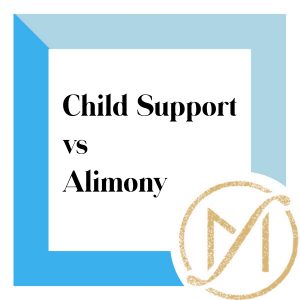Child Support vs Alimony

What is the difference between alimony and child support? Read on to learn more about child support vs alimony — including the differences (and similarities) between the two.
Child Support vs Alimony Basics
Both alimony (also called spousal support) and child support are payments made from one person to another after a relationship transition. Courts can only award alimony in a divorce. On the other hand, child support can be awarded in a custody action (where the parents never married) or in a divorce. Reduced to the most basic terms, alimony is a payment for the support of a former spouse while child support is a payment for the support of a child.
Length of Alimony Versus Child Support
By contrast, alimony can be:
- “Temporary” or “pendente lite” alimony while the divorce is pending
- ‘Time limited” or “rehabilitative” alimony (relatively short-term), and
- “Open ended” or “lifetime” alimony
Waiver
Another difference between alimony and child support is that spouses can waive alimony but parents cannot waive child support. Even if child support is paid in a lump sum, the court still has the authority to order parents to pay additional child support.
Read: Does Connecticut Have Lifetime Alimony?
Purpose of Child Support vs Alimony
Child support in Connecticut is based on the two parents’ combined net income rather than on the actual costs (think necessary living expenses like food, shelter, and clothing) associated with raising a child. Connecticut intends child support payments to cover the basics — including shelter, food, and clothes.
The purpose of child support is to provide for the care and well-being of minor children and not to equalize the available income of the parents. Sometimes, courts use alimony to equalize parents’ income for some period of time. Nevertheless, household expenses may be a proper component of child support where the expenses are necessary to maintain the family home for the benefit of the children.
Therefore, the distinction between expenses addressed via child support versus alimony can be muddled. This is particularly true when the child resides primarily with the alimony recipient. For example, rent or mortgage payment payments, utility bills, and groceries all relate to both a parent and child who live together. To complicate things further, sometimes courts base alimony (in part) upon the expenses the recipient will incur for benefit of the children. In other words, child support may cover the basics, but alimony may help a recipient spouse cover the extras.
Read: What Does Child Support Cover?
Read: How Alimony Works in Connecticut
Calculating Alimony vs Child Support
Connecticut’s statutes provide a set of factors for courts to consider in determining alimony. Similarly, our statutes also provide a set of factors for judges to weigh in deciding child support.
Many of the child support factors overlap with the alimony factors. For example, both include the parents’ respective:
- age
- health
- station
- occupation
- earning capacity
- amount and sources of income
- estate
- vocational skills
- employability
There are some factors that courts consider for alimony that they don’t need to consider for child support. For example, they include the length of the marriage, the reasons for the breakdown in the marriage, and property division in the divorce. When it comes to child support, in addition to the factors, a judge must consider the calculation under the Child Support Guidelines.
Read: How Does Child Support Work in Connecticut?
Read: What Factors Are Considered When Determining Alimony in a Connecticut Divorce?
The Comprehensive Connecticut Alimony Guide
Alimony is one of the most important issues in divorces. And, it’s one of the most confusing. The good news is that this means there is tremendous flexibility to craft an individualized approach. In order to prepare to make solid and informed decisions, you need to understand how alimony works. Our Comprehensive Connecticut Alimony Guide tells you everything you need to know about alimony in Connecticut.
Read: Alimony: The Comprehensive Connecticut Guide
Next Steps
The specifics of how alimony and child support might work for you depends on the ins and outs of your situation and your goals.
Our first step at Freed Marcroft, the Goals & Planning Conference, is designed to get to the heart of your problem and unveil your true goals for your life. Once we discover your goals for your life, we are able to take all of our collective experience with divorce, law, the available ways to divorce, strategy, courts, judges, and other lawyers, and build a divorce customized for you.








